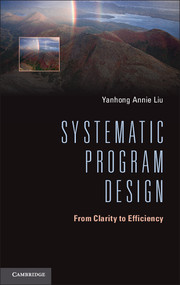6 - Objects: incrementalize across module abstraction
Published online by Cambridge University Press: 05 June 2013
Summary
For building large systems, it is essential to build them from components and use module abstraction, that is, abstraction of both data and control in modules or components, to separate what functionalities are provided by a component from how the functionalities are implemented inside the component. Module abstraction is best supported as abstract data types. An abstract data type is an interface for a certain set of operations on a certain kind of data, that is, the “what”, shielding users from having to know how the data are represented and how the operations are implemented, that is, the “how”. It is a fundamental concept in modern high-level programming languages, particularly object-oriented languages.
Unfortunately, clear and modular implementations of the modules or components result in poor performance when nontrivial query operations are frequently performed and values of query parameters are gradually updated. At the same time, efficient implementations that incrementally maintain the query results with respect to updates to parameter values are much more difficult to develop and to understand, because the code grows significantly and is no longer clear or modular. Because the definitions and uses of queries and updates can cross multiple components, transforming clear implementations of the queries into efficient incremental implementations requires incrementalization across module abstraction.
- Type
- Chapter
- Information
- Systematic Program DesignFrom Clarity to Efficiency, pp. 151 - 186Publisher: Cambridge University PressPrint publication year: 2013



